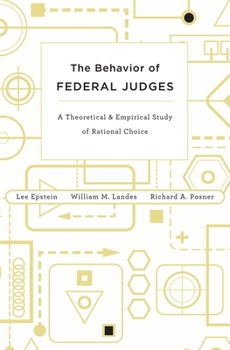The Behavior of Federal Judges: a theoretical and empirical study of rational choice
Judges play a central role in the American legal system, but their behavior as decision-makers is not well understood, even among themselves. The system permits judges to be quite secretive (and most of them are), so indirect methods are required to ma
Format:Hardcover
Language:English
ISBN:0674049896
ISBN13:9780674049895
Release Date:January 2013
Publisher:Harvard
Length:440 Pages
Weight:1.90 lbs.
Dimensions:1.5" x 6.5" x 9.3"
Related Subjects
Judicial Branch Law Political Science Politics & Government Politics & Social SciencesCustomer Reviews
0 rating





